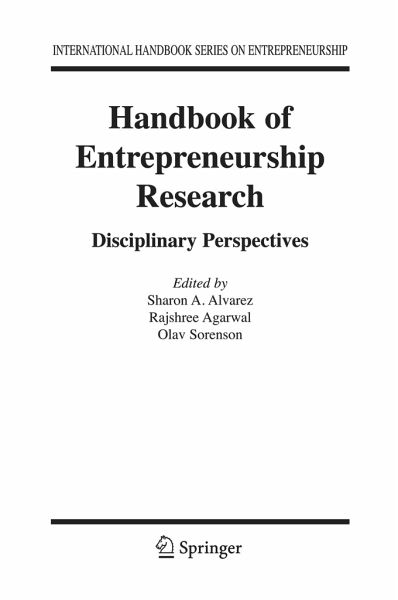
Handbook of Entrepreneurship Research
Disciplinary Perspectives
Herausgegeben: Alvarez, Sharon A.; Agarwal, Rajshree R.; Sorenson, Olav

PAYBACK Punkte
77 °P sammeln!
The Handbook of Entrepreneurship Research: Disciplinary Perspectives strives to increase awareness and stimulate research in numerous important topics in the field, particularly those underdeveloped areas of study with more relevance to scholarship and theory than to the practice of entrepreneurship. For example, less research has focused on the importance of the macroeconomic environment to firm founding, on social and kinship ties as sources of entrepreneurial activity, and the interaction between institutions and entrepreneurship. We do so by drawing attention to the relevant research in the disciplines of economics and sociology. This volume of the Handbook hopes to begin to bridge the gap between the research in entrepreneurship and the core disciplines by introducing views of entrepreneurship from disciplinary perspectives. As such, this volume of the Handbook is intended to complement and build on the first volume by focusing on a select set of issues and examining them in an in-depth manner.
early economic thinkers and classic works such as Cantillon (1755), Knight (1921), and Kirzner (1973). The paper opens by explaining how uncertainty and thus entrepreneurship disappeared from microeconomic theory as it became increasingly formalized (and stylized). It then goes on to bring the entrepreneur and entrepreneurial decision-making back into economic theory by focusing on the interrelationships among actors, knowledge, and perceived economic opportunities using a resource-based framework. The third paper in this section (Chapter 4) is by Foss and Klein, "Entrepreneurship and the Economic Theory of the Firm: Any Gains from Trade?" Foss and Klein strongly link theories of the firm to entrepreneurship, arguing a fundamental and intrinsic connection between the two. They, like Mahoney and Michael, explain how entrepreneurship became less important in economic models as the general equilibrium model became dominant. Foss and Klein ask: Does the entrepreneur need a firm? Theyfocus on the judgment of the entrepreneur and suggest that this judgment is exercised through asset ownership and starting a firm. Foss and Klein further argue that it is through this notion of judgment that heterogeneous assets combine to meet future wants.














